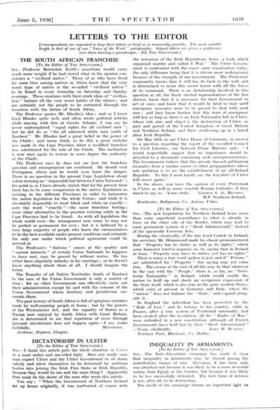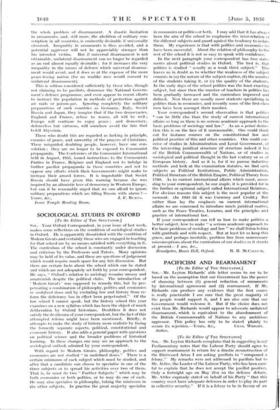INEQUALITY IN ARMAMENTS
[To the Editor of THE SPECTATOR.] SIR,—The Italo-Abyssinian campaign has made it cleat that inequality in armaments may be classed among the contributory causes of war. Abyssinia, it has been said, was attacked not because it was likely to be a more desirable colony than Egypt or the Soudan, but because it was likely to be less successfully defended. The best form of defence is not, after all, to be defenceless.
The result of the campaign throws an important light on the whole problem of disarmament. A drastic limitation in armaments, and, still more, the abolition of military con- scription in all countries, is eminently desirable if universally observed. Inequality in armaments is thus avoided, and a potential aggressor will not be appreciably stronger than his intended victim. But if universal disarmament is not obtainable, unilateral disarmament can no longer be regarded as an end almost equally desirable ; for it increases the very inequality in the means of defence which universal disarma- ment would avoid, and it does so at the expense of the more peace-loving nation (for no warlike race would consent to unilateral disarmament).
This is seldom considered sufficiently by those who, though not claiming to be pacifists, denounce the National Govern- ment's defence programme, and even appear to resent efforts to instruct the population in methods of protection against air raids or poison-gas. Ignoring completely the military preparations of such countries as Germany, Italy, Soviet Russia and Japan, they imagine that if the two democracies, England and France, refuse to rearm, all will be well ; Europe will continue to enjoy peace ; and democracy, defenceless but virtuous, will somehow avoid the fate that befell Abyssinia.
Those who doubt this are regarded as lacking in principle, enemies of peace, and unworthy of the prayers of Christians. These misguided doubting people, however, have one con- solation; they are no longer to be exposed to Communist propaganda. The Conference of the Communist International held in August, 1935, issued instructions to the Communists Parties in France, Belgium and England not to indulge in further pacifist propaganda in those countries and not to oppose any efforts which their Governments might make to increase their armed forces. It is improbable that Soviet Russia should have given this warning because she was inspired by an altruistic love of democracy in Western Europe, but can it be reasonably urged that we can afford to ignore military preparations which are filling Russia with alarm ?-
Yours, &c., J. F. BURNS. Inner Temple Reading Room.















































 Previous page
Previous page